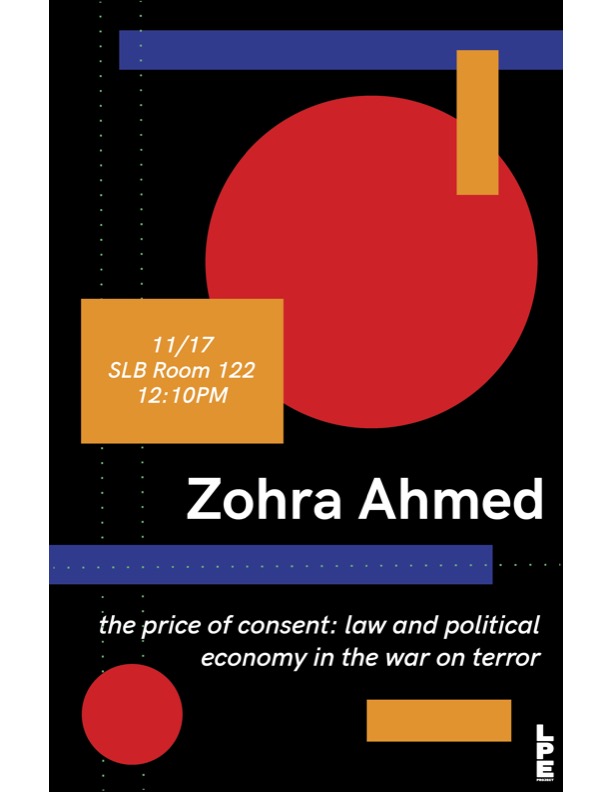Please join the Yale Program in Law and Political Economy and YLS LPE Student Group for an in-person event November 17 at 12:10pm (RSVP req’d) with Professor Zohra Ahmed (University of Georgia School of Law). Professor Ahmed will be discussing a work in progress, titled “The Price of Consent: Law and Political Economy in the War on Terror.”
“This article elucidates the law and political economy of the global war on terror (GWOT). Using U.S.-Pakistan relations as a case study, it shows how the U.S. deploys its power as a creditor to secure a state’s consent for its military activities.
In the GWOT’s the first decade, beginning in 2001, the U.S. openly engaged in forcible regime change; in its second and (now) third decade, the U.S. wages sporadic and covert counterinsurgency campaigns. To engage in these military maneuvers, the U.S. depends on partnerships with other states, such as Pakistan. The U.S. relies on the doctrine of consent to exonerate its actions there, arguing that local Pakistani authorities have consented to them.
Using its perch at the International Monetary Fund (IMF), the U.S. has shaped the sovereignty of low-income and indebted states like Pakistan. The U.S. and the IMF have helped cultivate debt dependency, an elite constituency that courts bailouts, and the military’s prominent role in political affairs. The U.S. has then leveraged these dynamics to secure Pakistan’s cooperation. Effectively, the U.S. has manufactured the conditions for consent by exploiting the sovereignty dilemmas of its more vulnerable partner state. It rewards Pakistan’s acquiescence with the financial credit it depends on and with political support for its military.
The legal systems governing both lending and the use-of-force facilitate this mode of extraterritorial rule. Both systems rely on a statist conception of sovereignty that heeds only the state’s external relations and obligations. Whether the debts incurred by a state benefit the country’s majority and whether its military can legitimately claim authority are not binding legal considerations. Together, these two systems of governance enable external relations of coercive interdependence, mediated by internal elite constituencies. This case study suggests that consent, as a safeguard against extra-territorial force and rule, is only as strong as the construction of sovereignty that underlies it.“
This is an in-person event. It will take place on Thursday, Nov. 17, at 12:10pm at Yale Law School (Sterling Law Building Room 122).
Please register [HERE].

